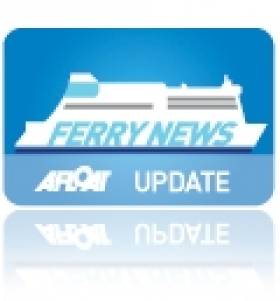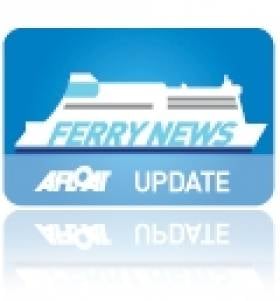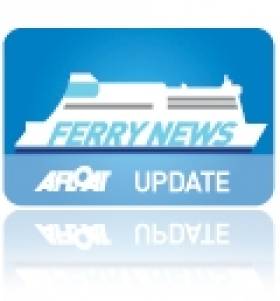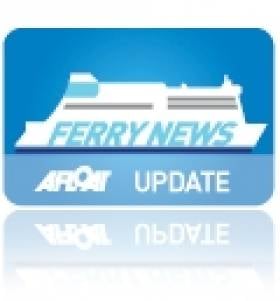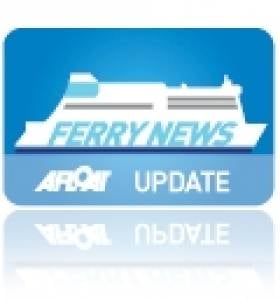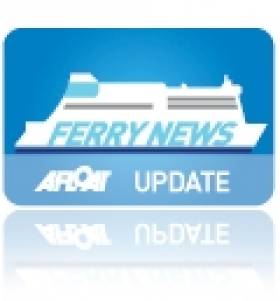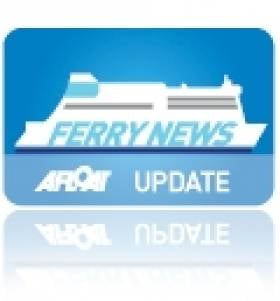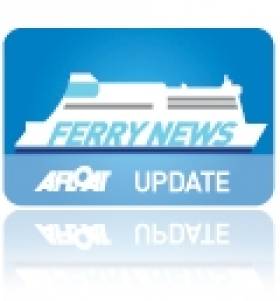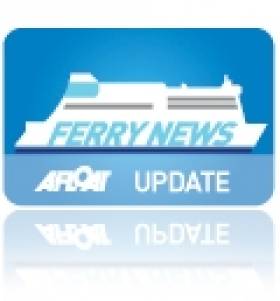Displaying items by tag: Ferry news
No Need to Whine as Autumn Shopping Breaks Continue to Cherbourg
#FERRY NEWS – Despite this week's final Irish Ferries seasonal-only sailing on the Rosslare-Roscoff for this year, the operator provides a service to Cherbourg, where Autumn Wine / Shopping Breaks are available to the Norman city that has four wine stores and two hypermarkets.
The cost of the break is based per adult (see website's tariff table) including return car ferry with a two-star inside cabin berth on board the cruiseferry Oscar Wilde and staying in the Hotel Campanile Cherbourg, sharing a twin/double room(s) with continental breakfast. The hotel is located just outside the city at La Glacerie and where additional nights are available.
There are also Mini-Cruises on offer (starting 26 September), which too provide an opportunity to stock up on beverages, for details click HERE.
Ferries Great and Small during Cork Harbour Open Weekend
#FERRY NEWS – Coinciding with Cork Harbour Open Weekend, will be the regular departure today of Brittany Ferries 'flagship' Pont-Aven (2004/41,748grt). The cruiseferry which features an indoor swimming pool, is scheduled to depart later this afternoon, writes Jehan Ashmore.
The cruiseferry operates on the shortest Irish-French route, taking 14 hours to reach the Breton port of Roscoff. The ferry only calls to Cork (Ringaskiddy) on Saturday's, on the seasonal-service which is to cease sailings in November. Currently the company has a single fare from €70 per person based on a car plus four passengers including a 4-berth inside cabin, for information click HERE.
While on a domestic front, services running within the waters of the natural harbour, are provided by Cork Harbour Cruises, where the tender Spirit of the Isles runs between Cork City centre downriver to Cobh. In September, sailings depart Cork at 11am (Saturdays and Sundays). The operator also provides tours beyond Cobh and a Spike Island tour. For details visit: www.corkharbourcruises.ie/tours.php
During the Cork Harbour Open Weekend, there will be free ferry (RIB based) shuttle services run by Whale of A Time, which will serve on a circuit throughout the lower harbour (on both days 12noon-3pm), for further details click HERE.
Stena Line's HSS Service Sounds Good for Lady Gaga
#LADY GAGA– Stena Line's HSS Stena Explorer is set to return to Dun Laoghaire Harbour this Sunday, despite last Tuesday's end of season sailings to Holyhead, as previously reported on Afloat.ie. The HSS has been specially chartered in to transport stage trucks following the Lady Gaga concert to be held this weekend in Dublin, writes Jehan Ashmore.
The US pop-star is to play her only Irish tour date on Saturday night in the Aviva Stadium. Following the New York musician's 'The Born This Way Ball' performance, the stage equipment is to be transported from the Ballsbridge venue by a convoy of 25 freight trucks to the ferryport in Dun Laoghaire for the sailing to Holyhead.
On arrival of the HSS into Dun Laoghaire, the fast-ferry will be in a 'light' mode, i.e. no passengers or vehicles on board. However on the return leg to Anglesey, the craft will be loaded with the stage trucks on the vehicle decks that are capable of loading in total 50 lorries (each of 15m in length).
Upon arrival in Holyhead, the truck convoy will travel 'landbridge' across the UK as they proceed onward to The Netherlands, where the tour continues in Amsterdam, at the cities Ziggo Dome.
However normal HSS sailings are to resume for 12 days over the Christmas /New Year period, for further information visit: www.stenaline.ie/ferry/book-now/hss-christmas-sailings-2012/
End of High-Season Stena HSS Sailings
#FERRY NEWS- Stena Line's seasonal-only Dun Laoghaire-Holyhead route run by the HSS Stena Explorer finished its last sailing today with a lunchtime departure bound for Anglesey. However the HSS service will return for twelve days over the Christmas / New Year period, writes Jehan Ashmore.
In the interim period the company will maintain their Dublin-Holyhead year-round route served by conventional ferries, Stena Adventurer and Stena Nordica. For information on the 3-hour 15 minute route and sailings schedules click HERE.
This is the second year in which the reduced HSS service has been operating to a single daily round trip, as Stena Line in recent years has strived to reduce costs on the 120 minute route served by the more expensive to run fuel-thirsty catamaran fast-ferry.
When sailings return on the Dun Laoghaire-Holyhead route during the festive period (see details), they are scheduled to run during three short stints, they are as follows: 20-23 December, 27-30 December and 2-5 January 2013.
Wind-Farm Proposal Requires No Isle of Man Shipping Re-routing
#MANX FERRY – A proposed extension to an offshore wind farm off Cumbria on the north-west coast of England will not require any re-routing of Isle of Man shipping lanes, say the developers.
A Dong Energy spokesman said the 200-turbine development would not, in isolation, present any problems. The extension is being proposed to a 102-turbine wind farm off Walney Island. The facility is said to be one of the largest in the world and in which opened earlier this year.
Emily Marshall, from Dong Energy, said: "We can confirm that re-routing shipping lanes will not be an issue." She added: "However, the Irish Sea is getting busier with other projects in the development phase and we are undertaking cumulative impact assessments for people who are concerned, with regards to commercial interests."
Irish Ferries Operating Profits Remain Unchanged at €3.2m
#FERRY NEWS- The Irish Continental Group (ICG) ferries division, Irish Ferries has recorded no change in operational profits for the first six months of 2012, compared to the same period last year.
According to its financial interim report, profit from operations was unchanged at €3.2 million (2011: €3.2 million), after a €2.5 million increase in fuel costs. Revenue in the division was €69.5 million (2011: €68.2 million).
Irish Ferries operates passenger and freight ferry services between Ireland-UK and between Ireland and France. In the first six months of 2012, Irish Ferries operated 2,087 sailings in the period, down 2.8% compared to the same period last year.
In the half year the operator reported an increase in total passengers carried of 0.9% at 676,700 while total cars carried in the first half of 2012 were 148,700, down 1.9% on the previous year, but at higher yields. The overall sea passenger market was down 3.3% and the car market was down 7.5%.
On the freight Ro-Ro sector, volumes were down 4.7% to 92,400 units, when compared with the first half of 2011 reflecting the weak economic backdrop. The total Ro-Ro market is estimated to be down about 3% in the six months.
The MV Kaitaki, the former Irish Sea serving Isle of Innishfree (1995/22,365grt), remained on charter to P&O during the period, trading in New Zealand. Since her transfer in 2006, the Dutch built ro-pax has been operating Interislanders' Wellington-Picton service which links the country's north and south islands.
Wilde Nights Cabaret with Oscar
#FERRY CABARET – Holiday makers taking peak sailings with Irish Ferries routes to France can enjoy the Wilde Nights Cabaret Show, on board the cruiseferry Oscar Wilde (1987/31,914grt), writes Jehan Ashmore.
Irish Ferries will resume Mini Cruises on 27 August, starting on the Rosslare-Roscoff route and followed next month, they will be made available on Rosslare-Cherbourg sailings. Dependent on which route is taken, the time ashore can be up to 8 hours in France.
Currently there is a special fare for a car, driver and reserved seat from €99 single. The price includes all taxes, noting bookings should be made at least 10 days in advance of travel date. This fare is applicable to sailings made between 2nd September to 19th December.
For further details and other special fares click HERE.
Inaugural High-Season for Celtic Link Ferries Newcomer
#CELTIC LINK – Rosslare-Cherbourg operator Celtic Link Ferries which runs the Celtic Horizon (2006/27,522grt) on the 17 hour route, is operating her first high-season, since the 940-passenger ship was introduced last October, writes Jehan Ashmore.
Celtic Link Ferries are the only company to provide an all year-round service on the Irish-French services which are also served by other operators running out of Rosslare and Cork.
The Celtic Horizon has larger and improved passenger facilities compared to predecessor Norman Voyager. Among the facilities on board the newcomer is the forward facing restaurant, the Cherbourg Café Lounge and adjoining children's playroom, cinema and Wi-Fi. Accommodation is provided in 110 cabins and vehicle decks for 200 cars and up to 120 freight trucks.
CLF have a short wine-break offer for a driver and companion, plus return car to stock up on your favourite French wines. The offer also includes a two berth outside cabin both ways and costs €200. For further, information click HERE.
‘Girl of My Heart’ to Make a Fleeting Port of Call
#MANX FERRY - This busy August Bank Holiday weekend sees the Isle of Man Steam Packet Co. Ltd's larger ferry Ben-My-Chree (Manx for 'Girl of my Heart') make an overnight round-trip sailing to Dublin Port, rather than the smaller fast-ferry craft Manannan, writes Jehan Ashmore.
Normally Ben-My-Chree, a conventional ro-pax ferry plies the Douglas-Heysham route, however with this evening's sailing taking 4hrs 45 minutes, she is scheduled to dock in Dublin Port just after midnight.
She is to berth at the same berth used frequently by Irish Ferries, however her turn-around is a mere 45 minutes before she returns to the island. Otherwise the Manannan, a 96m wave-piercing catamaran fast-ferry takes only 2hrs 55 minutes to cover the Irish route which is a seasonal-only service.
Instead Manannan is to operate this evenings Liverpool-Douglas sailing. She will stay overnight in the Manx capital so to take up tomorrow morning's crossing to Belfast, which is also run on a seasonal basis.
Irish Ferries Appoints New Head of Passenger Sales
#FERRY NEWS –Irish Ferries has appointed Dermot Merrigan as Head of Passenger Sales for Ireland, UK and France.
Merrigan joined Irish Ferries 22 years ago and has extensive experience within the company's passenger business. Previously he held the posts of Contact Centre Manager and, before that, Commercial Coordinator with the company's division Irish Ferries Holidays.
A native of Dublin, he is married and succeeds Declan Mescall who retired after 34 years service with the company.



























